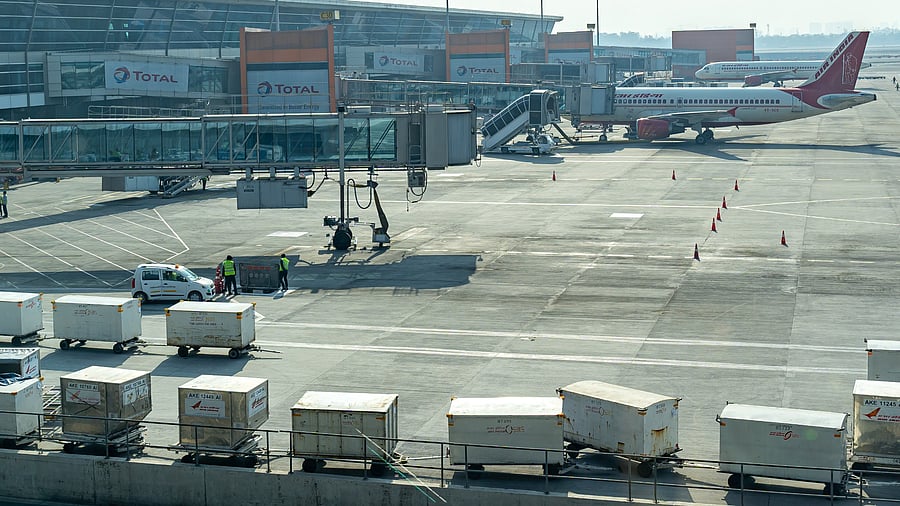
Ground staff in Delhi. (Representative image)
Credit: iStock Photo
New Delhi: The Delhi High Court on Monday dismissed a plea by Turkish-based company Celebi Airport Services India Private Limited, engaged in ground handling services of different international airports, including of Bengaluru, for the last 17 years against withdrawal of security clearance to it in the wake of 'Operation Sindoor'.
A bench of Justice Sachin Datta agreed with the contention of the Union government led by Solicitor General Tushar Mehta that in the context of a ground or cargo handling agency, with access to sensitive areas of airports, which operated in a sensitive domain, any national security concerns would inherently necessitate swift executive action.
The court said, "Any action taken by the Director General of the Bureau of Civil Aviation for the purpose of revocation of any security clearance on the basis of inputs received from the law enforcement/intelligence agency cannot be considered to be an act inconsistent with the Aircrafts Rules 2023."
Celebi Airport Services India Private Limited, was engaged in providing professional ground handling services at Indira Gandhi International Airport (Delhi), Cochin International Airport, Bengaluru International Airport, Rajiv Gandhi International Airport (Hyderabad), and Goa International Airport. They stated they were rendering services for the last 17 years.
It was aggrieved with the May 15, 2025 decision of the Bureau of Civil Aviation Security, withdrawing security clearance.
The petitioners represented by senior advocate Mukul Rohatgi said the decision was taken unilaterally, without furnishing any reasons, and more importantly, without affording the petitioners any opportunity of being heard.
The bench, however, said it has been recognised that the concerned specialised agencies are in the best position to assess the demands of national security and the court would not second guess the same unless the facts are such that no reasonable person could have ever reached the conclusion that the national security considerations were involved.
"However, once national security considerations are found to be in play, then, the court would not second guess the rationale or sufficiency of the action taken," the bench said.
The petitioners contended that since the statutory rule itself contemplated that the cancellation of security clearance must be preceded by an opportunity of hearing, it was impermissible to take any action in disregard of the said procedure.
The court, however, said, this argument is misconceived.
In its judgment, the bench said, "This court is of the considered view that interpreting Rule 12 of Aircraft (Security) Rules, 2023, as mandating a pre-decisional hearing in every case, regardless of the nature of security concerns, would frustrate the very objective for which the Director General of the Bureau of Civil Aviation Security has been vested with powers to issue directions/orders in the interest of national and civil aviation security".
The court said, the imperative to act swiftly and decisively in urgent or emergent situations, would be seriously undermined by such an interpretation.
The bench pointed out the action taken by the Director General of Bureau of Civil Aviation was also consistent with the stipulation incorporated in the communication whereby the security clearance of the petitioners was renewed on December 21, 2022.
The court also explained the power conferred by the statutory provision was peremptory and not contingent or depending on any statutory rules including Rule 12 of the 2023 Rules.
"Section 6 (power of the central government to issue order in emergencies) of the Aircraft Act makes it obligatory on the Director General of Bureau of Civil Aviation to issue any direction/order for the purpose of safeguarding and securing the civil aviation operations and in the interest of security of India," it said.
The court also said Section 6 cannot be interpreted in a manner which divests the Director
General of the Bureau of Civil Aviation Security of the authority to take emergent action, even if warranted, based on security considerations.
"Such an interpretation, as canvassed on behalf of the petitioners would completely defeat the purpose of the statutory stipulation," the bench held.
The court also said, to read Rule 12 as mandating any inflexible procedural requirements, even in cases involving emergent national security considerations, would defeat the purpose of the Rule.
"Such an approach not only disregards the purpose behind vesting wide and immediate powers in the Director General but also impedes the fulfilment of India’s international obligations under the Convention on International Civil Aviation. Accordingly, such an interpretation deserves to be rejected," the bench said.
Section 6 specifically refers to and empower the Director General of Civil Aviation Security to issue orders/directions to ensure the safe operation of the aerodrome and safeguarding civil aviation operations in the interest of national security, the court pointed out.
"As such, the alleged infraction of Rule 12 of Aircraft (Security) Rules, 2023, cannot impinge upon the validity of the impugned action," the bench said.
